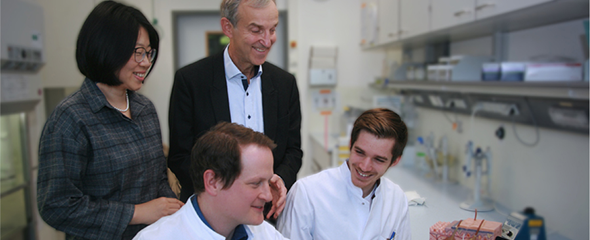It was already known that in both psoriasis and neurodermatitis, T-cells of the immune system migrate from the blood into the skin and drive the inflammation there. Detailed examination of T-cells in blood and skin now led to evidence that in atopic dermatitis they migrate mainly into the skin, whereas in psoriasis they both drive inflammation in the skin and move from the blood into other tissues. Further findings suggested that the inflammatory factors produced by the T-cells in atopic dermatitis act primarily on skin cells, whereas in psoriasis they also activate circulating immune cells in the blood, potentially triggering or increasing inflammation elsewhere in the body. “This underlines that in psoriasis, possible disease symptoms must also be investigated beyond the skin. If necessary, the joints or the cardiovascular system may then also need to be treated, for example,” says Dr Stephan Traidl.
The team also found out that macrophages (phagocytes), which are also found in the skin in both diseases, develop differently and differ in terms of their inflammatory mediators. “This is very interesting with regard to neurodermatitis. Because here, skin infections with pathogens such as staphylococci and herpes viruses can occur, which are directly fought by the macrophages,” says Dr Lennart Rösner.
Neurodermatitis and psoriasis
Atopic dermatitis progresses in episodes and is manifested by pronounced itchy eczema. In Germany, more than ten percent of children of preschool age are affected, but also about two percent of all adults. The disease begins with a defect in the skin barrier in interaction with changes in the immune system. The triggers for a worsening are manifold – allergens, skin-irritating substances, mechanical stimuli, infections and psychological stress are among them.
Psoriasis is characterised by skin plaques on the stretched side. In Germany, about two to four percent of all adults are affected, mainly in the second and third decades of life. Both diseases are treated externally and internally, depending on their severity. In recent years, there have been a number of effective new developments in this field. In the MHH Clinic for Dermatology, Allergology and Venereology, corresponding special hours are offered.
To the press release on the RESIST website
Original publications
Zhang B, Roesner LM, Traidl S, Koeken VACM, Xu CJ, Werfel T, Li Y. Single-cell profiles reveal distinctive immune response in atopic dermatitis in contrast to psoriasis. Allergy. 2022 Aug 20. doi: 10.1111/all.15486. Epub ahead of print.
Roesner LM, Farag AK, Pospich R, Traidl S, Werfel T. T-cell receptor sequencing specifies psoriasis as a systemic and atopic dermatitis as a skin-focused, allergen-driven disease. Allergy. 2022 Sep;77(9):2737-2747. doi: 10.1111/all.15272. Epub 2022 Mar 14.
About the RESIST Cluster
Within the Cluster of Excellence RESIST – Resolving Infection Susceptibility - scientists aim to gain a better understanding of infection susceptibility. The focus of RESIST is on people who are at particular risk for infections, such as newborns, elderly and individuals with a dampened immune response due to therapeutic reasons. RESIST is a powerful research consortium with six research and clinical institutions across Germany. These institutions combine excellent basic research with internationally leading clinical research and access to patients. The consortium will lay the scientific basis for the development of innovative approaches to prevent, diagnose and treat severe infections in susceptible patients.

